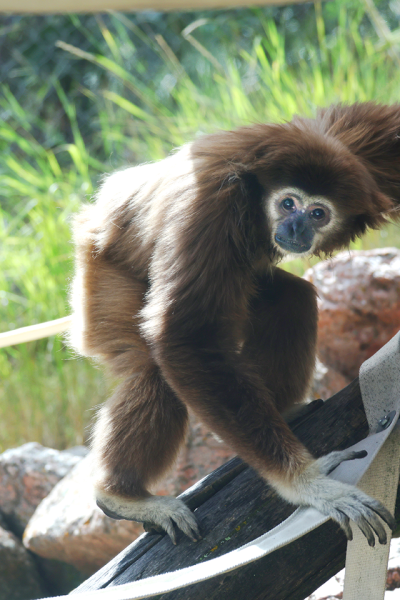Meet Keoki, an 8-year-old female lar gibbon! Keoki (pronounced key-OH-key) recently arrived from Omaha’s Henry Doorly Zoo & Aquarium and is settling into her new home. Already visible to guests in Primate World, her captivating eyes, tiny nose and adorable hairdo are quickly melting hearts.
Keoki is starting to bond with her care team and has already shown interest in training — especially if cherries are on the menu! She will gently take pitted cherries from her care team and make soft cooing sounds while she eats them. One of her favorite spots in her new home is a hammock high up in her habitat, which her care team now calls her ‘throne.’ From there, she likes to watch guests down below.
Inside scoop: A male lar gibbon will soon be joining Keoki in Primate World! Stay tuned for updates.
The arrival of Keoki and the male gibbon support the Gibbon Species Survival Plan, helping to manage a diverse and healthy population in human care while inspiring gibbon preservation for their wild counterparts. Lar gibbons usually live in small family groups made up of a bonded pair and their offspring.
Lar gibbons, also known as white-handed gibbons, are endangered primates native to the tropical forests of Indonesia, Laos, Malaysia, Myanmar and Thailand. Similar to orangutans, lar gibbons are impacted by unsustainable palm oil production, which has led to deforestation and the loss of their natural habitat. When produced sustainably, palm oil is the most productive edible oil available. Oil palms – the trees that palm oil comes from – produce four to ten times more oil than alternatives like soy, olive, canola and coconut. Switching to these alternatives would cause even more deforestation in tropical areas.
Luckily, you can help save their rainforests from the comfort of your own smartphone. Download the World Association of Zoos and Aquariums (WAZA) free mobile smartphone app, PalmOil Scan, from the Apple App Store or Google Play today. Next time you go shopping, just open your app, scan a product’s barcode, and see how that company ranks. If they haven’t committed to sustainable palm oil, consider instead supporting a similar company that has. This app was developed under the World Association of Zoos & Aquariums (WAZA) and is managed for North America by Cheyenne Mountain Zoo. PalmOil Scan is available in the United States, Canada, the United Kingdom, Singapore, Australia and New Zealand.
Download the app today and learn more at cmzoo.org/palmoil.

